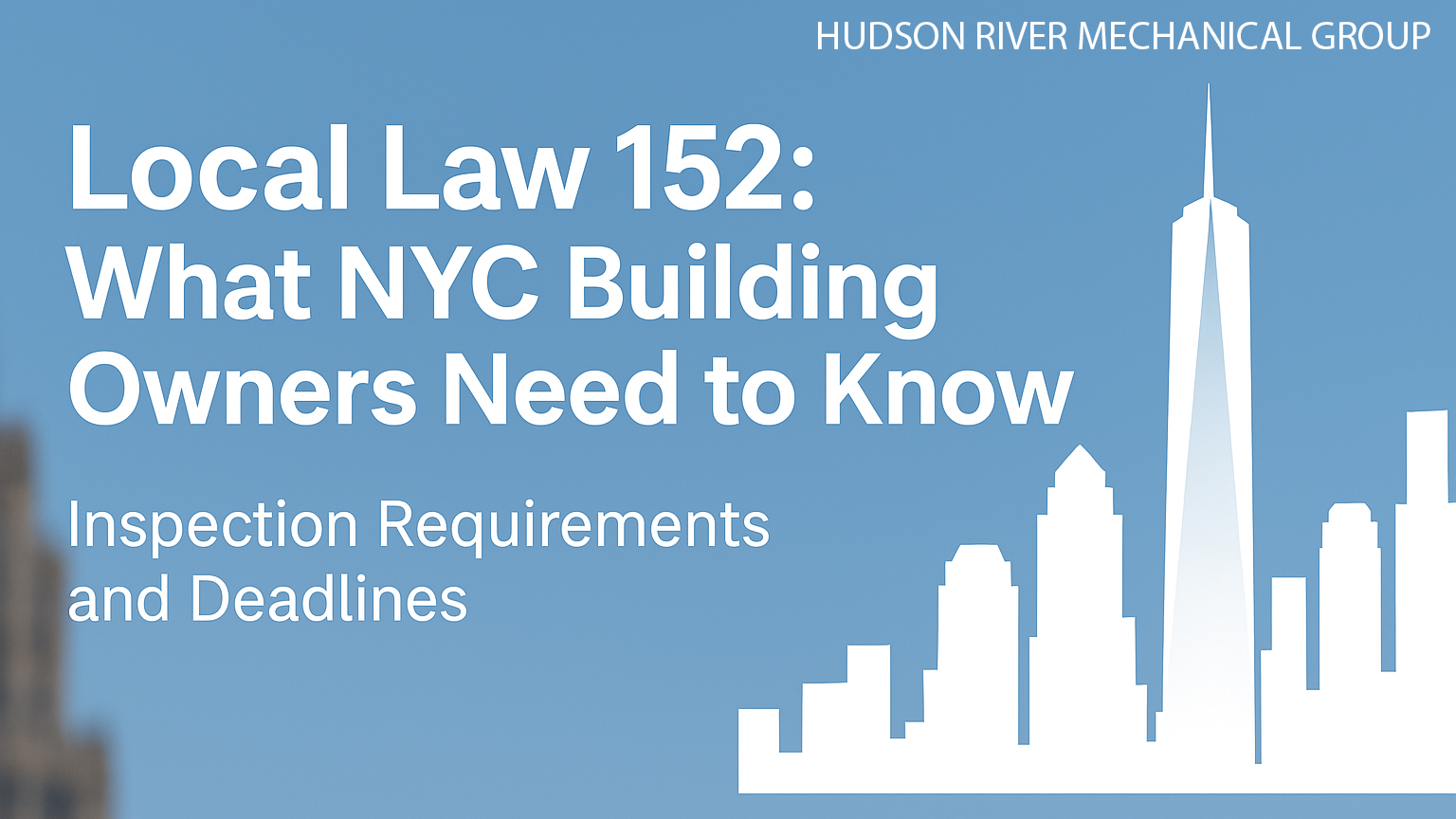Everything NYC Building Owners Need to Know About Local Law 152—and Why a Licensed Master Plumber Is Your Best Ally
New York City’s skyline rises on an invisible network of gas lines that cook our food and heat our homes. After several tragic gas‑related explosions, the City Council passed Local Law 152 of 2016 (LL152) to make sure that network stays safe. The law requires regular, professional inspections of building gas‑piping systems—not just once, but on an ongoing four‑year cycle. Below is a practical, plain‑English guide to what LL152 demands, who must comply, when the deadlines fall, and how a Licensed Master Plumber (LMP) can simplify the entire process for you.
1. What exactly is Local Law 152?
LL152 is part of a broader gas‑safety package enacted in 2016. Its core requirement is simple: all buildings in New York City with gas piping (with very limited exceptions) must undergo a visual, leak‑detection, and corrosion inspection of all exposed gas lines at least once every four years. The first inspection cycle started on January 1 2020. The goal is to catch small leaks, illegal taps, deteriorated pipe, or missing permits before they become catastrophes. (nyc.gov)
2. Which buildings does the law cover—and which ones are off the hook?
Covered: Apartment buildings, mixed‑use buildings, commercial properties, institutional facilities, factories, etc.
Exempt*: One‑ and two‑family homes, buildings in Occupancy Group R‑3 (small residential & boarding‑house classifications such as A0–A9, B1–B3, B9, CM, M3–M4, N2, S0–S2, V).
*Even if your building has no gas piping at all, you must still file a one‑page “No Gas Piping Certification” (form GPS2) with the Department of Buildings (DOB). (nyc.gov)
3. When is my next inspection due?
Inspection cycles are divided into four sub-cycles (A, B, C, D) across NYC’s 59 community districts:
- A: Districts 1, 3, 10 (Closed – 2024)
- B: Districts 2, 5, 7, 13, 18 (Jan 1 – Dec 31, 2025)
- C: Districts 4, 6, 8, 9, 16 (2026)
- D: Districts 11, 12, 14, 15, 17 (2027)
If you’re in Sub‑cycle B, schedule your inspection promptly as deadlines approach quickly. Owners who miss their window must request a one‑time, 180‑day DOB extension before the deadline.
4. What happens during an LL152 inspection?
- Visual examination of all exposed gas piping in common areas.
- Leak detection using approved equipment.
- Valve tagging and accessibility verification.
- Inspection for corrosion, illegal modifications, or unpermitted alterations.
- Verification of signage and tenant access to emergency shut-off valves.
A detailed Gas Piping System Inspection Report (GPS1) is issued within 30 days.
5. Who can perform and sign off on the inspection?
Inspections must be conducted by either:
- A Licensed Master Plumber (LMP) registered with DOB.
- An individual with at least five years’ experience supervised by an LMP and approved by DOB.
6. The compliance timeline—step by step
- Hire an LMP well before the district deadline.
- Perform the inspection.
- Receive GPS1 report (30 days).
- File Gas Piping System Periodic Inspection Certification (GPS2) with DOB (within 60 days).
- Fix deficiencies: minor (120 days), major (180 days).
- Maintain records for 10 years.
7. Penalties for ignoring or flubbing LL152
- $5,000 fine for late filing.
- Gas shut-off by utility providers.
- Potential voiding of insurance coverage.
- DOB violations impacting property transactions.
8. How a Licensed Master Plumber adds value beyond the bare minimum
- Pre-inspection evaluations.
- Comprehensive DOB paperwork management.
- Authorized repair and permitting.
- Handling extension requests.
- Utility coordination for timely restoration.
- Thorough record keeping.
- Effective tenant communication.
9. Frequently asked owner questions
- “Do sealed-off gas risers require inspection?” Yes, unless officially certified otherwise.
- “Can my building super inspect?” No, inspections require a DOB-approved inspector.
- “Will gas be shut off immediately?” Only in imminent hazard cases.
10. Action checklist for 2025
- Identify your community district.
- Book your LMP inspection immediately if in sub-cycle B.
- Collect prior gas permits and documentation.
- Budget for minor repairs.
- Set a reminder for the next cycle.
Final thoughts
Local Law 152 isn’t a bureaucratic annoyance—it’s a city-wide safety net. By investing in a timely inspection with a reputable Licensed Master Plumber, you protect tenants, safeguard your property value, and avoid fines or gas shut-offs. Integrate LL152 compliance into your routine maintenance, ensuring your building—and your peace of mind—remains secure.
